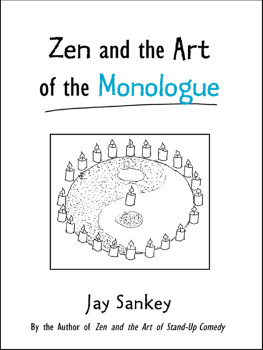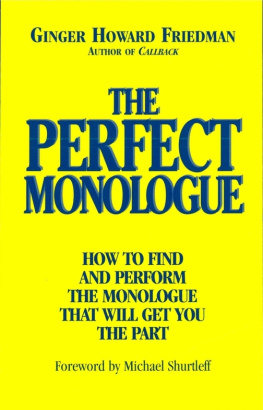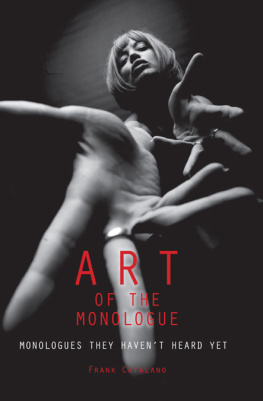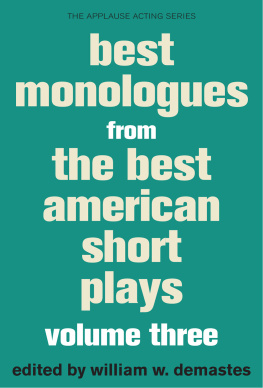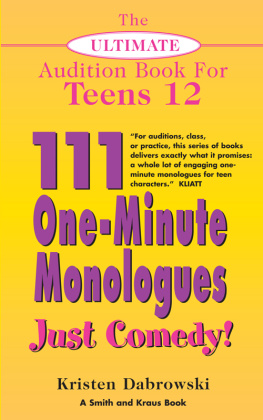Sankey Jay - Zen and the Art of the Monologue
Here you can read online Sankey Jay - Zen and the Art of the Monologue full text of the book (entire story) in english for free. Download pdf and epub, get meaning, cover and reviews about this ebook. year: 2011, publisher: Taylor & Francis Group, genre: Home and family. Description of the work, (preface) as well as reviews are available. Best literature library LitArk.com created for fans of good reading and offers a wide selection of genres:
Romance novel
Science fiction
Adventure
Detective
Science
History
Home and family
Prose
Art
Politics
Computer
Non-fiction
Religion
Business
Children
Humor
Choose a favorite category and find really read worthwhile books. Enjoy immersion in the world of imagination, feel the emotions of the characters or learn something new for yourself, make an fascinating discovery.
- Book:Zen and the Art of the Monologue
- Author:
- Publisher:Taylor & Francis Group
- Genre:
- Year:2011
- Rating:4 / 5
- Favourites:Add to favourites
- Your mark:
- 80
- 1
- 2
- 3
- 4
- 5
Zen and the Art of the Monologue: summary, description and annotation
We offer to read an annotation, description, summary or preface (depends on what the author of the book "Zen and the Art of the Monologue" wrote himself). If you haven't found the necessary information about the book — write in the comments, we will try to find it.
Zen and the Art of the Monologue — read online for free the complete book (whole text) full work
Below is the text of the book, divided by pages. System saving the place of the last page read, allows you to conveniently read the book "Zen and the Art of the Monologue" online for free, without having to search again every time where you left off. Put a bookmark, and you can go to the page where you finished reading at any time.
Font size:
Interval:
Bookmark:


Routledge
New York and London
Published in 2000 by Routledge
29 West 35th St.
New York, NY 10001
Published in Great Britain by Routledge
11 New Fetter Lane
London EC4P 4EE
Routledge is an imprint of the Taylor & Francis Group.
This edition published in the Taylor & Francis e-Library, 2002.
Copyright 2000 by Routledge
All rights reserved. No part of this book may be reprinted or reproduced or utilized in any form or by any electronic, mechanical, or other means, now known or hereafter invented, including photocopying and recording or in any information storage or retrieval system, without permission in writing from the publishers.
Library of Congress Cataloging-in-Publication Data
Sankey, Jay, 1963
Zen and the art of the monologue / Jay Sankey.
p. cm.
Includes bibliographical references.
ISBN 0-87830-094-5 (pbk.)
1. Monologue. I. Title.
PN1530 .S26 2000
792--dc21 00-055339
ISBN 0-203-90230-0 Master e-book ISBN
ISBN 0-203-90234-3 (Glassbook Format)
I have had to strip myself naked. One does not like what one sees then, and one is afraid of what others will see and do. To challenge ones deepest, most nameless fears is also to challenge the heavens. It is to drag yourself and everything and everyone you love to the attention of the fiercest of the gods; who may not forgive your impertinence, who may not spare you.
James Baldwin
Oddly, the more personal something is, the more universal it is as well. When we dig deeper to truthful experiences, thats the work that really touches people and connects us all.
Bill Watterson, creator of the cartoon strip Calvin and Hobbes
The practice of zen is forgetting the self in the act of uniting with something else.
Koun Yamada
This book is dedicated to my very dear friends Jason Maloney, David Peck, and David Acer for always making me feel that my thoughts and feelings are worth sharing. And to Meredith. Sweet angel, it was worth the wait.
To believe that what is true for you is true for all men. That is genius.
Henry Miller
Standing while others are seated can be a brazen act. But to stand there in front of everyone and boldly share your thoughts and feelings can be the act of a revolutionary, a social dissidentor at least an upstart. For such an act reflects a belief that is still a tad heretical, even in these modern times: the belief in taking ones own personal experience seriously; the belief that, as personal as it is, it is nonetheless a part of a larger, collective truth.
This belief presents a great many challenges, both to yourself and to others. After all, what are you to them? And why should they spend even a single moment listening to you talk? Taking ones own inner life seriously and having a fervent desire to share it with others also dares the ego to take the wheel, drive to the closest greasy spoon, tuck a napkin into its shirt collar, and shovel as much crap into itself as possible, bloating it up to a truly monstrous size.
Yet for me, so much of standing up and speaking my mind in front of strangers comes down to trusttrust in the act of sharing; trust in myself, that I can handle being misunderstood, and even more frightening, being understood; and most of all, trust that perhaps none of us are really strangers after all.
At first glance, this may seem to be a book of questions and answers about monologuing. But in truth it is a small book about an enormous subject: unique perspective and the art and craft of sharing. For example, while the questions reflect a wide range of perspectives, the answers reflect but one. Mine. Actually, my own background in the art of monologuing lies much more in the area of solo shows than that of soliloquies and short monologues performed for acting auditions or within the context of a larger play. This book does, however, explore a great many aspects of the monologue form, including the use of monologues for acting auditions and the role of monologues in full plays.
Our experiences give rise to our answers, whether in matters artistic or metaphysic. And though my own answers in the realm of the monologue are based on experience (lending the book some credibility), I believe perhaps an even more valid answer to any of the questions asked in this book is, Its really up to you. Or, Experience and find out for yourself.
Why then did I bother writing this book? Well, I remember once reading about how, around the turn of this century, professional safecrackers would routinely brush sandpaper across their fingertips to make them all the more sensitive to the task at hand. Think of this book then as a couple hundred sheets of sandpaper, written in the hope that as you flip through them, you too will become a little more sensitive and receptive to the fascinating personal challenges involved in the writing and performing of your own monologue. Your storyand ours.
Jay Sankey Toronto, Canada August 2000
The Monologue
Words have the power to destroy or heal. When words are both true and kind, they can change our world.
Shunryu Suzuki
A monologue is a predominantly verbal presentation given by a single person featuring a collection of ideas, often loosely assembled around one or more themes. Note that I do not define it as a strictly verbal presentation; many, though certainly not all, successful monologuists also employ nonverbal elements to great effect, such as, their use of facial expressions and hand gestures, along with a variety of props and stage devices.
No, its not okay. In fact, its very wrong. Its a monologue, coming from the Greek word mono, which means singular, one, alone. Just you. No friends. No family. No supporting actors. No highly publicized cameos. You are alone onstage: accept it.
Zen insists on personal experience and insight.
Irmgard Schloegl
Both a play and a monologue have a script, a performance, and (on a good night) an audience . But while a play usually features several performers, a monologue has but one. A play, with its usual cast of several performers, has much more with which to appeal to not only the audiences eyes but their minds and hearts as well. Several actors make group dynamics possible and provide a much greater variety of physical actions onstage. This in turn gives many more possibilities for an engaging narrative.
As a monologuist, you have none of this. From one moment to the next the audiences attention remains solely yours. But what incredible freedom! This combination of intense attention and personal freedom is in fact one of the most powerful attractions to the monologue form.
Of course, such freedom also represents a very real danger, especially to the vain or inexperienced, as it offers more than enough rope for the impetuous to hang themselves. Monologues also tend to explore a single event or theme from various intellectual and emotional vantage points, rather than, like plays, telling a long and complicated story. In most monologues, not a lot actually happens. Again, this is probably because action is not one of the natural strengths of the form. Nevertheless, an hour of mere telling can get excruciatingly dull for performers and audiences alike, which is why really effective monologues tend to explore and examine the most intimate contents of a human soul. In response to the intensity of an entire audiences silent, respectful, even expectant focus, the monologuist works to share his or her most personal thoughts with equal intensity.
Font size:
Interval:
Bookmark:
Similar books «Zen and the Art of the Monologue»
Look at similar books to Zen and the Art of the Monologue. We have selected literature similar in name and meaning in the hope of providing readers with more options to find new, interesting, not yet read works.
Discussion, reviews of the book Zen and the Art of the Monologue and just readers' own opinions. Leave your comments, write what you think about the work, its meaning or the main characters. Specify what exactly you liked and what you didn't like, and why you think so.

